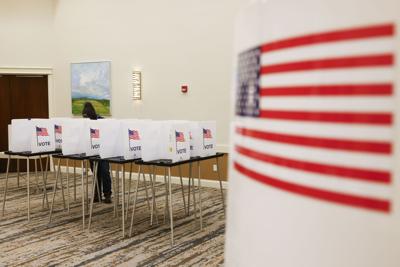The city of Madison had already spent $1.5 million in private grant funding for new election equipment before Wisconsin voters approved a ban on such money for local governments.
Voters resoundingly approved two state constitutional amendments April 2 that would ban not just the private grant funding but also restrict who can be involved in administering elections in Wisconsin.
Statewide, voters in all but nine counties moved to approve the ban on private election funding. One of the nine was Dane County, where residents voted over 2-to-1 to reject the amendment.
[Looking for information on how to vote in Wisconsin? Check out our voter guide!]
The second amendment, which restricted election administration to only “election officials designated by law,” gained somewhat more widespread support.
Both measures come as a response to Wisconsin's 2020 elections, when hundreds of municipalities received private grants from the Center for Tech and Civic Life, backed by Facebook founder Mark Zuckerberg and his wife, to help administer elections amid the COVID-19 pandemic.
The amendments raised questions for local election officials, who worried about the vagueness of the language and its possible impacts on their operations.
But there won’t be uncertainty for Madison officials regarding $1.5 million in funding they received from the Center for Tech and Civic Life over the course of 2023 and 2024.
City Attorney Michael Haas confirmed the City Council in January approved spending the money to buy new election-related equipment.
The council approved $229,608 to buy lockable security carts to help transport election equipment.
Council members also signed off on a little over $1 million to purchase a system that will help manage and process absentee ballots, with an eye toward automating processes that are currently conducted by human workers. It is estimated that the new equipment, which is set to be delivered in August, would save the city over $970,000 over six years.
Proponents of the constitutional amendments argued the bans were needed to avoid the appearance of impropriety brought by outside support for elections.
The language of the resolution approved by city of Madison officials stated that the money would not be used “to cause any private inurement or improper private benefit to occur” or support one party over another.
Haas said city officials moved quickly knowing that they couldn’t spend the money if the amendments were approved and the election results certified.
“It certainly expedited matters once we knew that it was going to be on the ballot to make sure that the city was able to spend those funds and there wasn't any question about it,” he said.
There were still lots of questions, Haas said, about how the second of the constitutional amendments would affect who could support election officials with the voting process. But the private funding ban, he said, was more straightforward.
The funding ban also raised concerns from critics, as it did not come with a guaranteed increase in state financial support for elections.
Haas said he doesn't think city officials were going to rely on private support for the foreseeable future, even without the funding ban being enacted.
“I don't think the clerk's office was counting on that,” he said.





